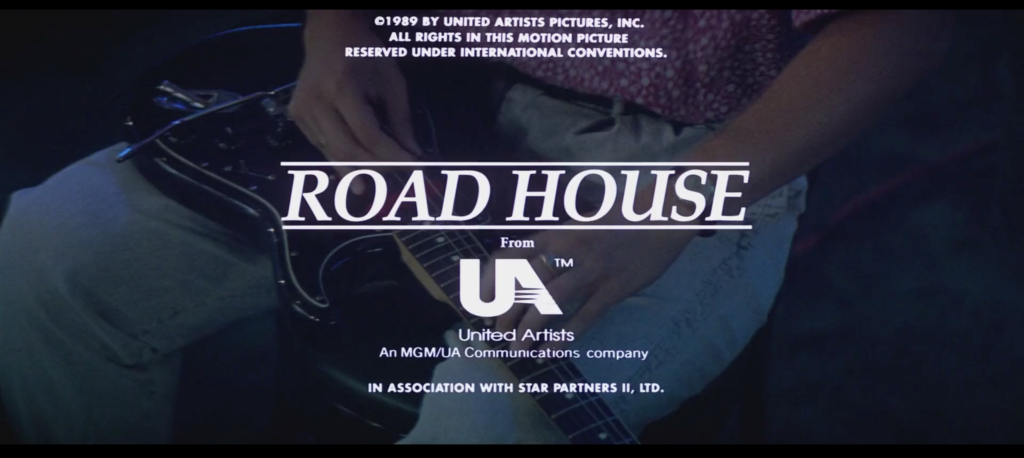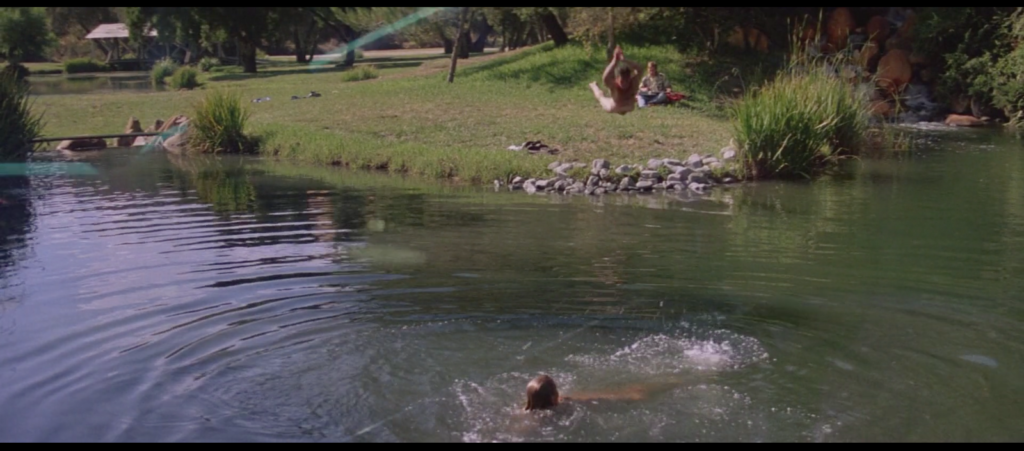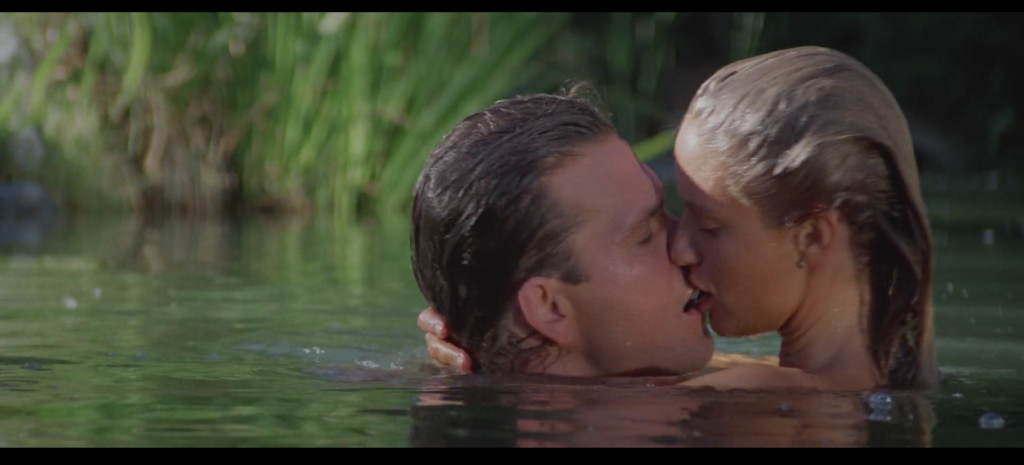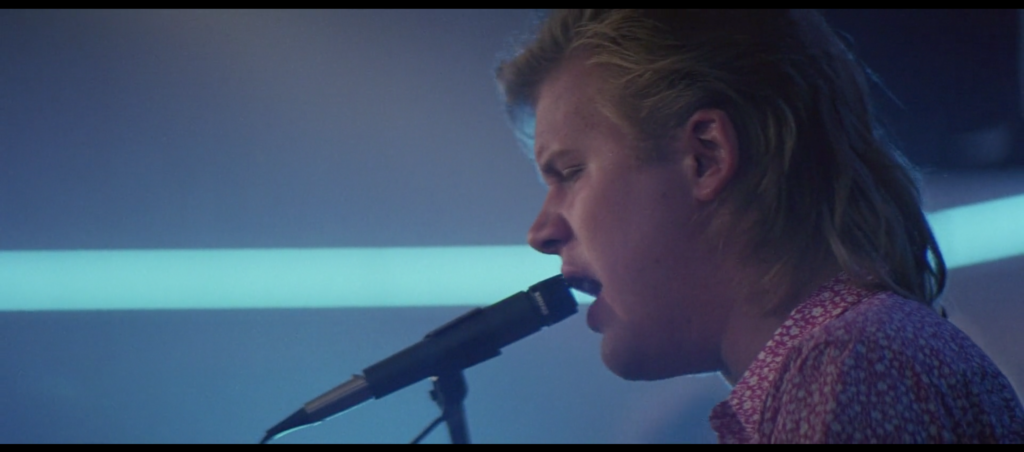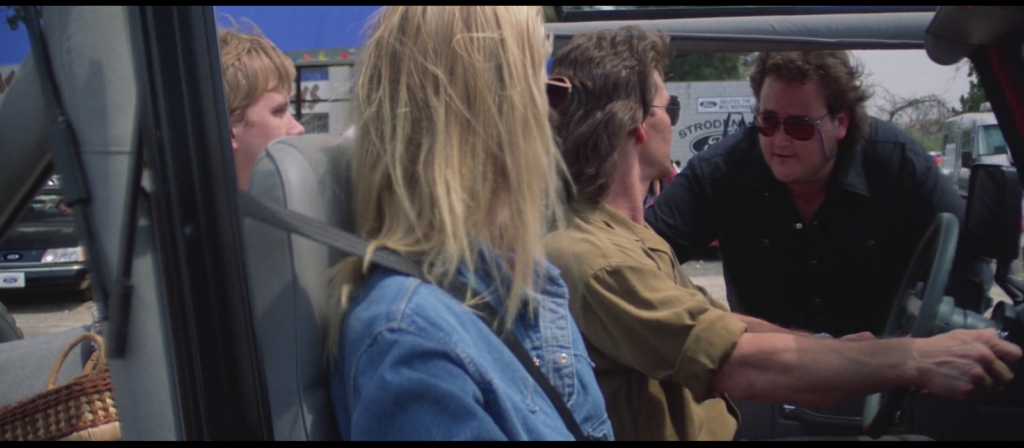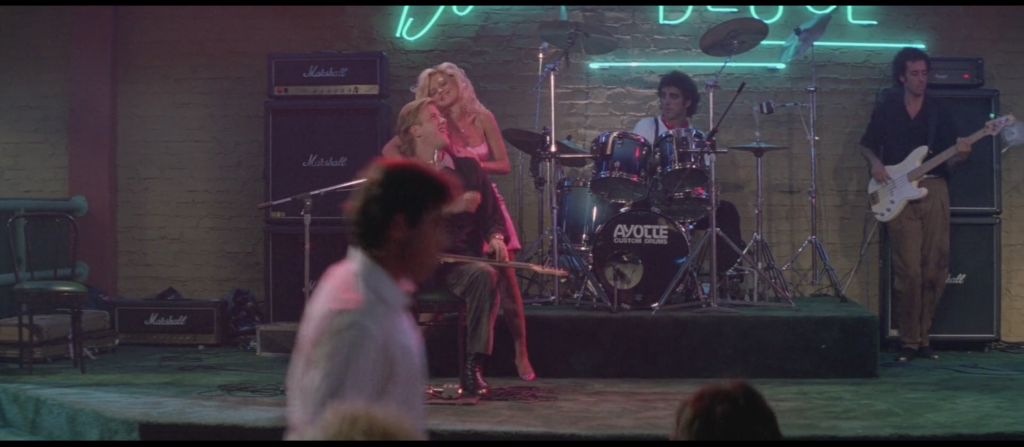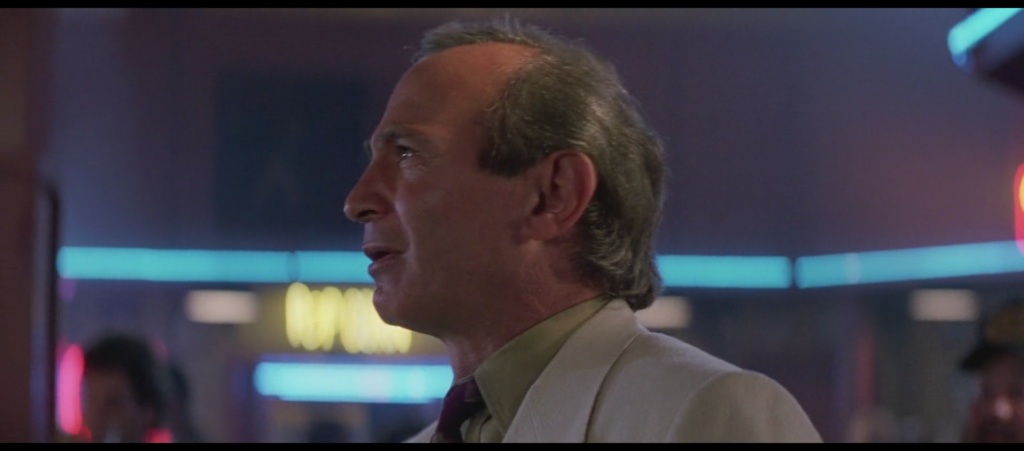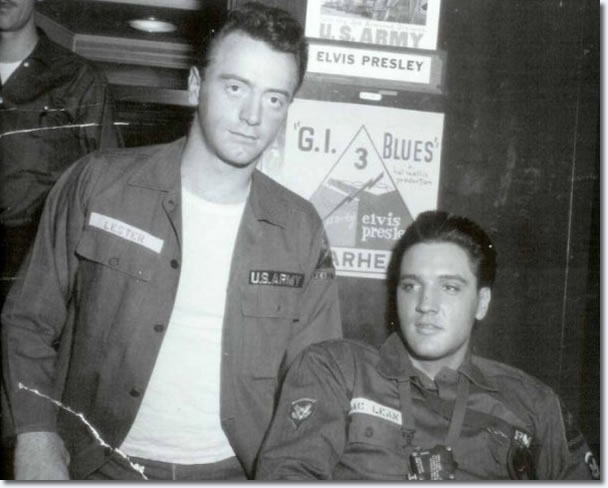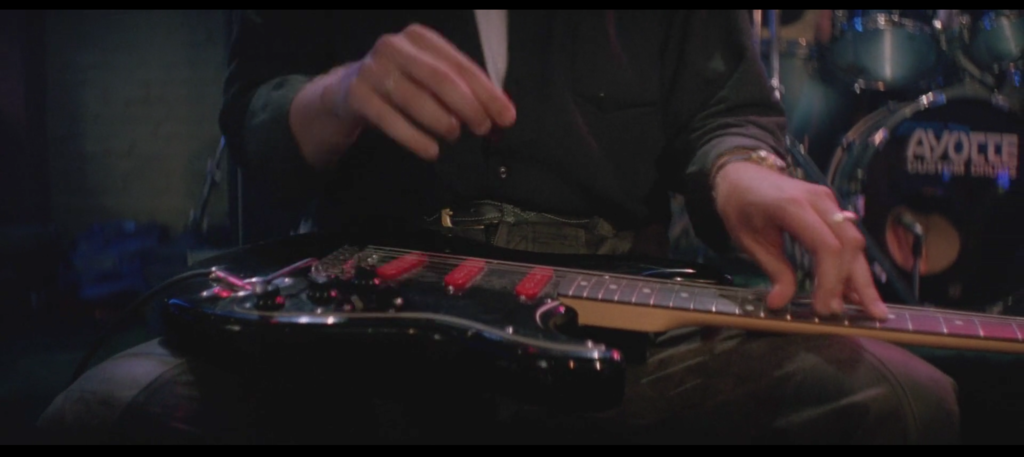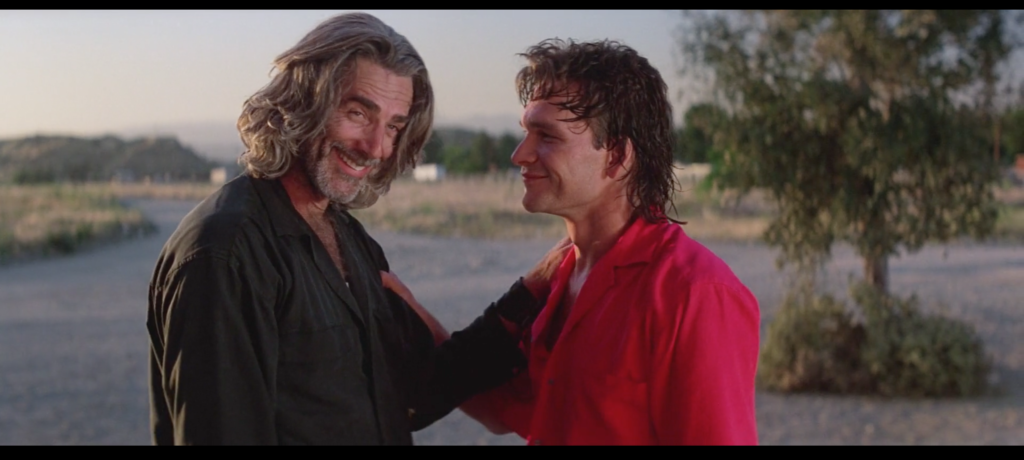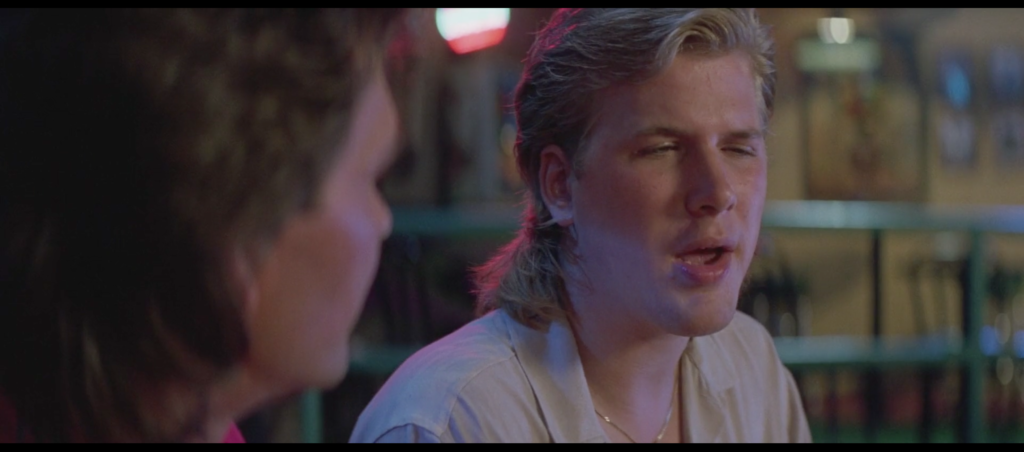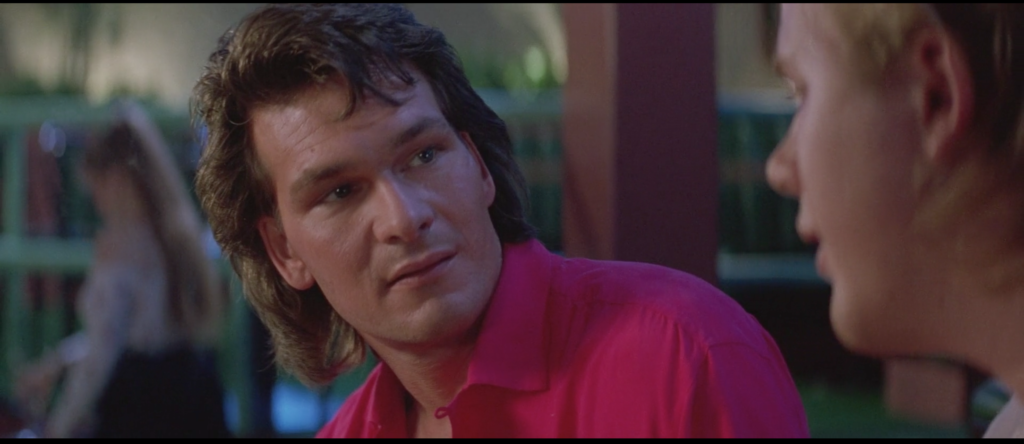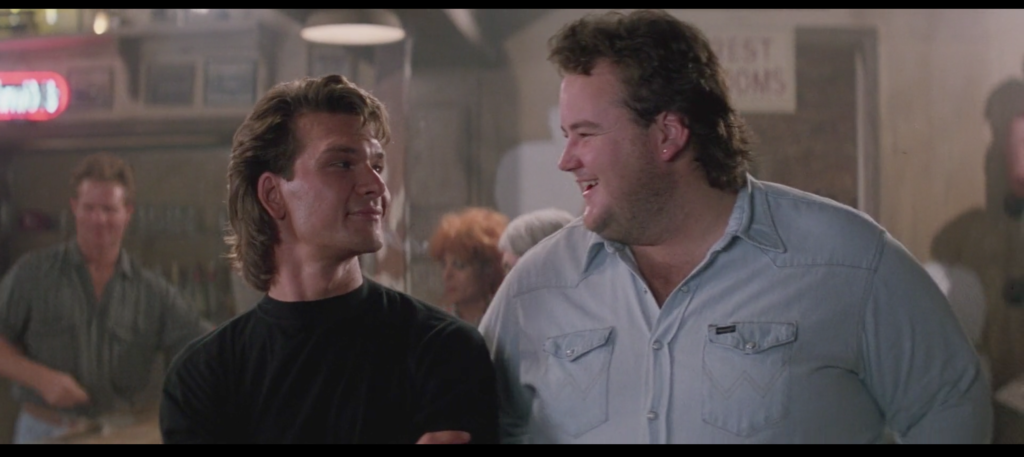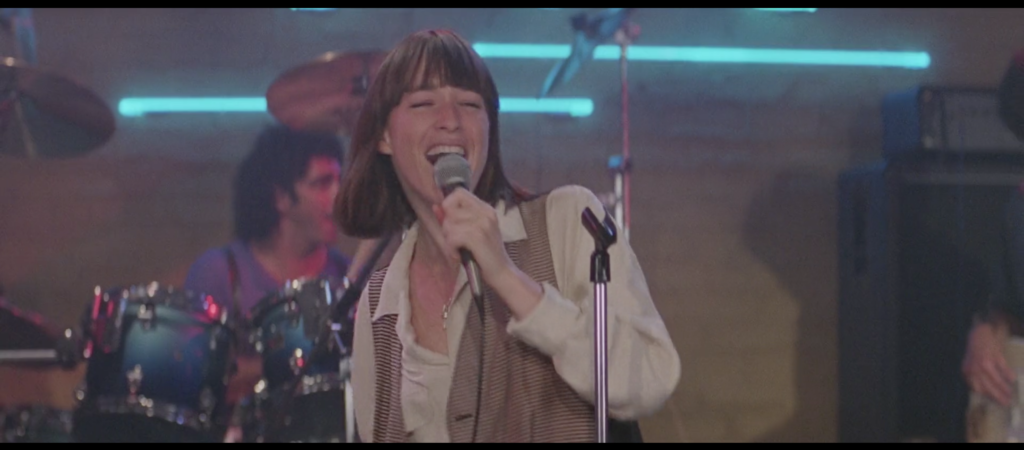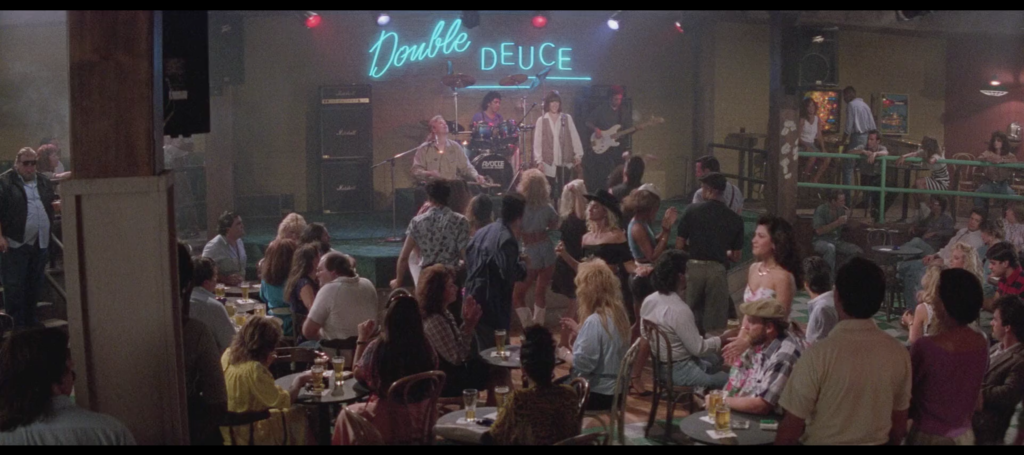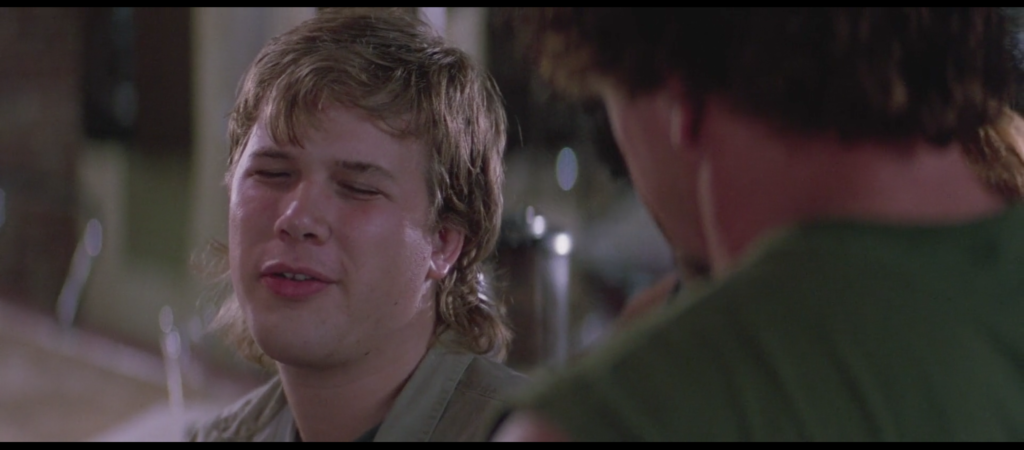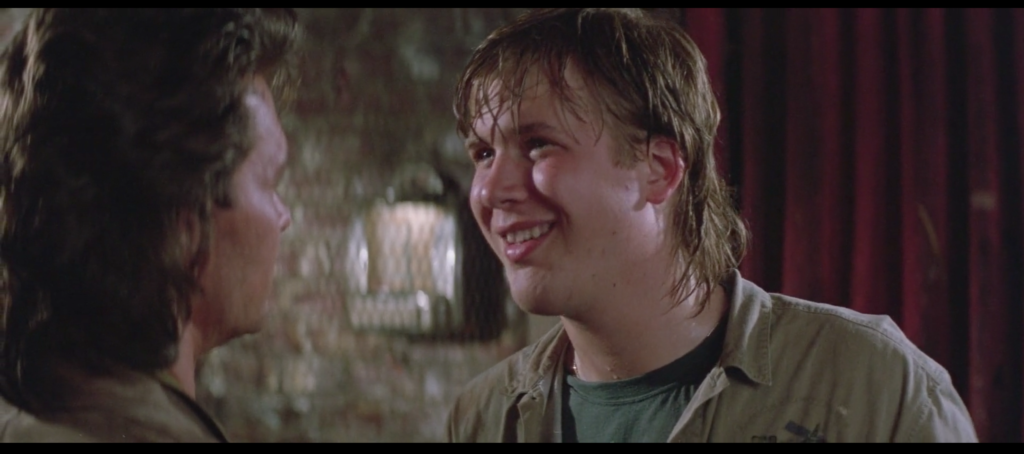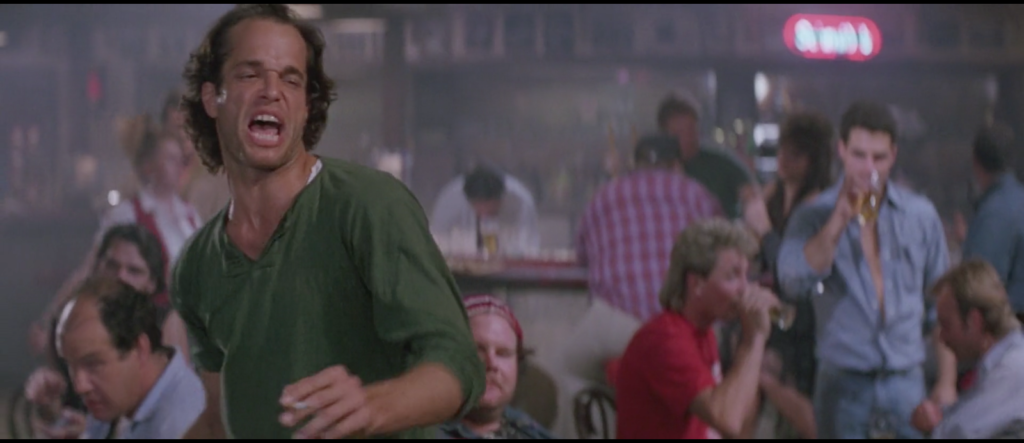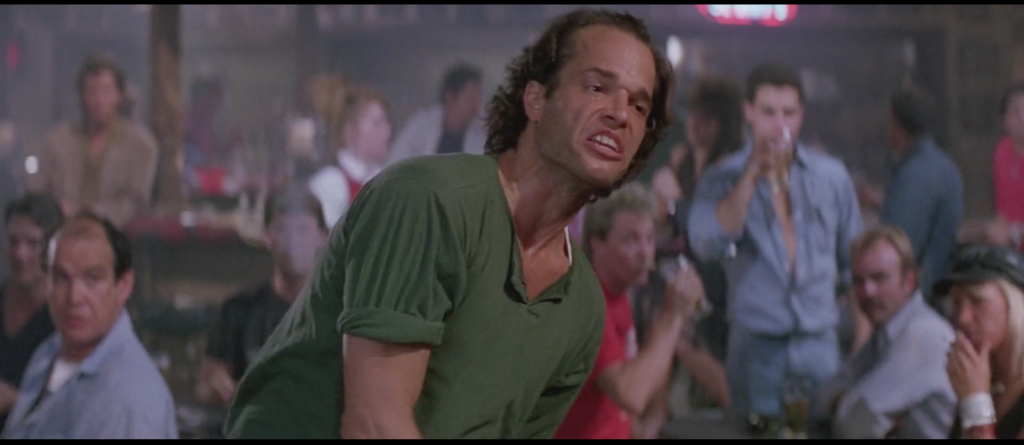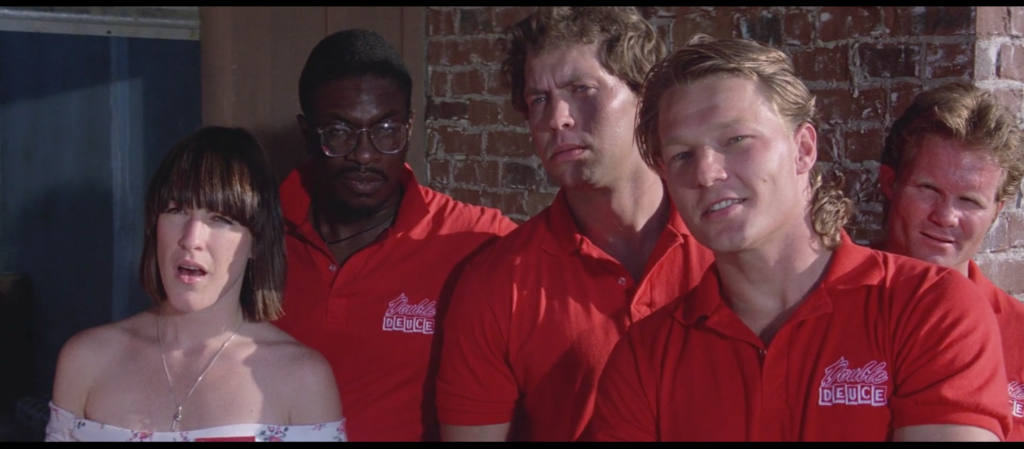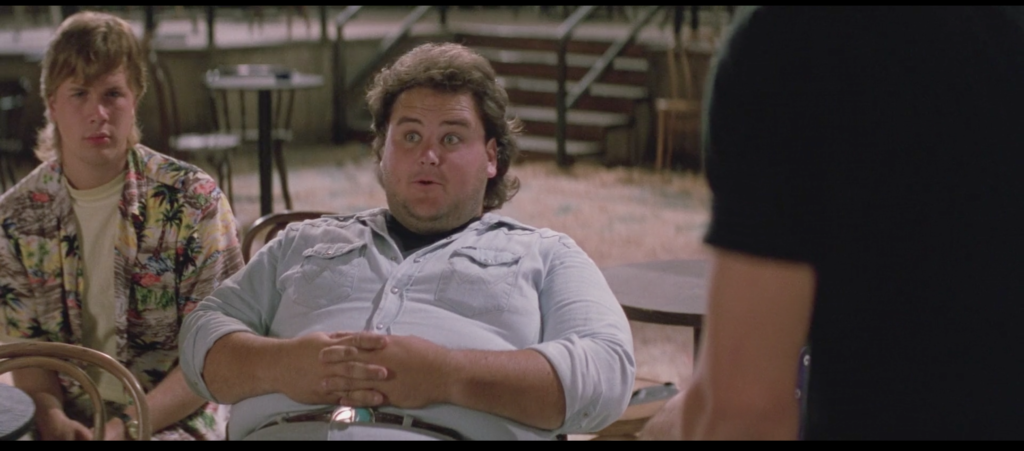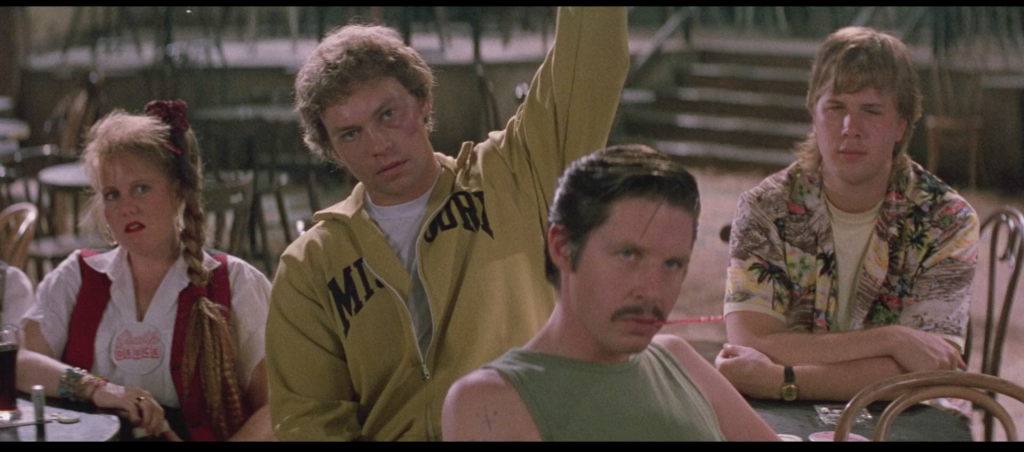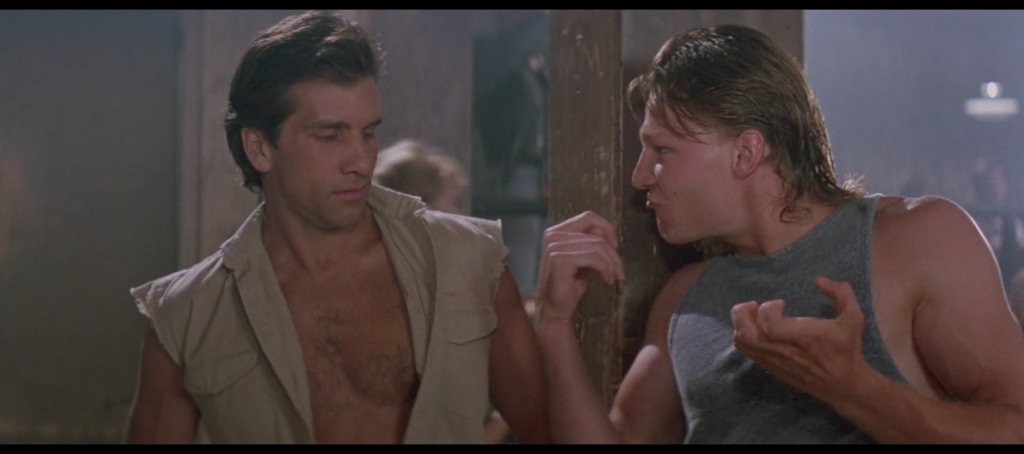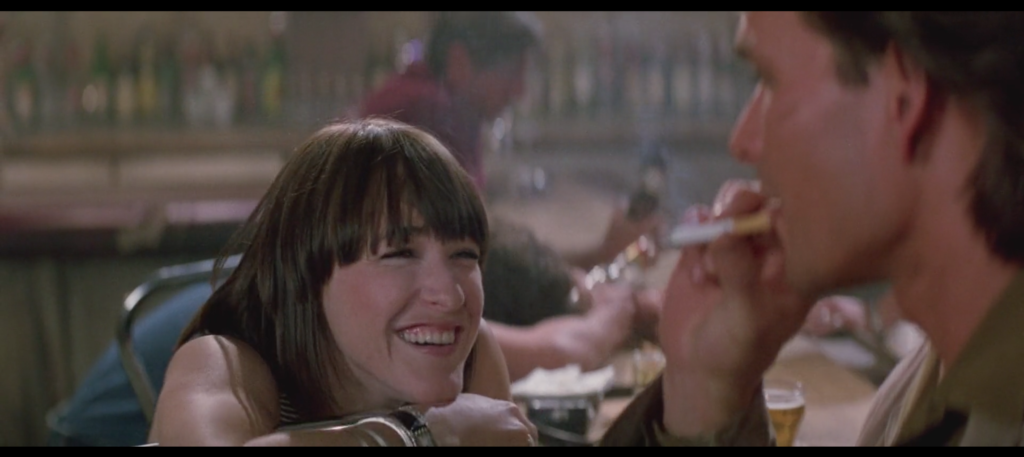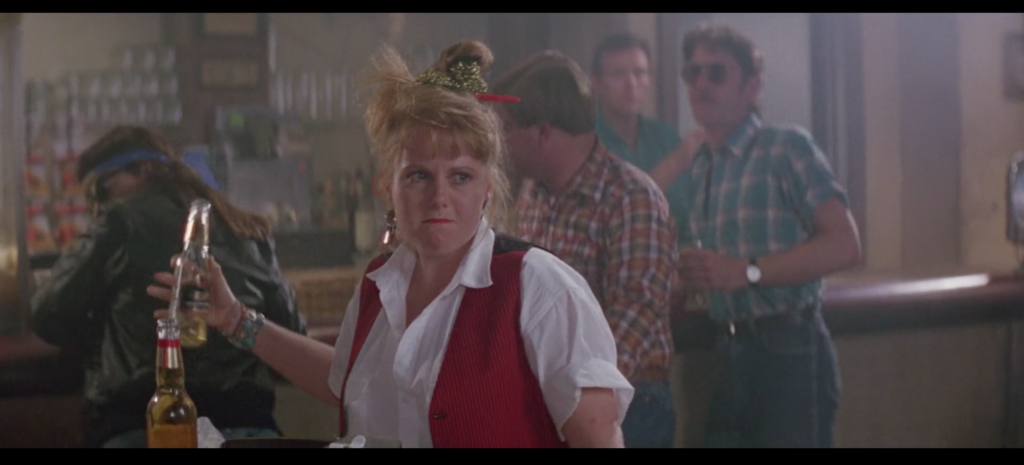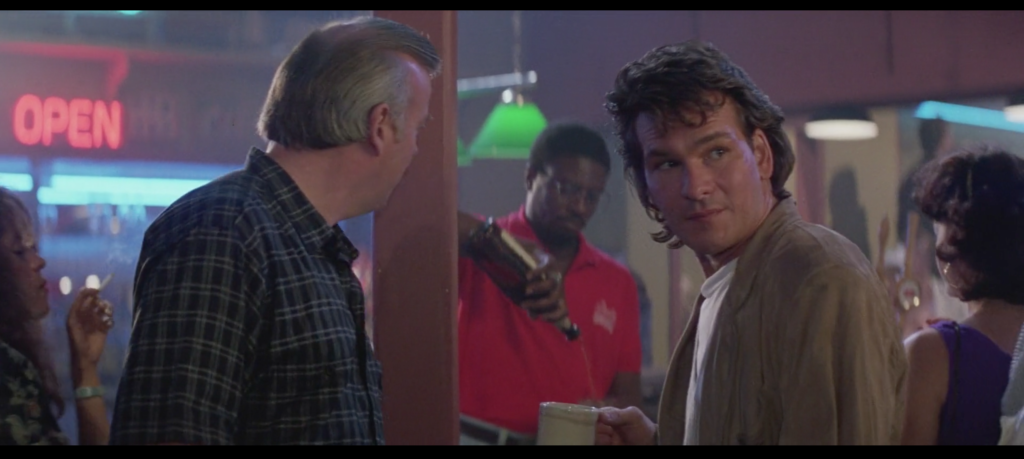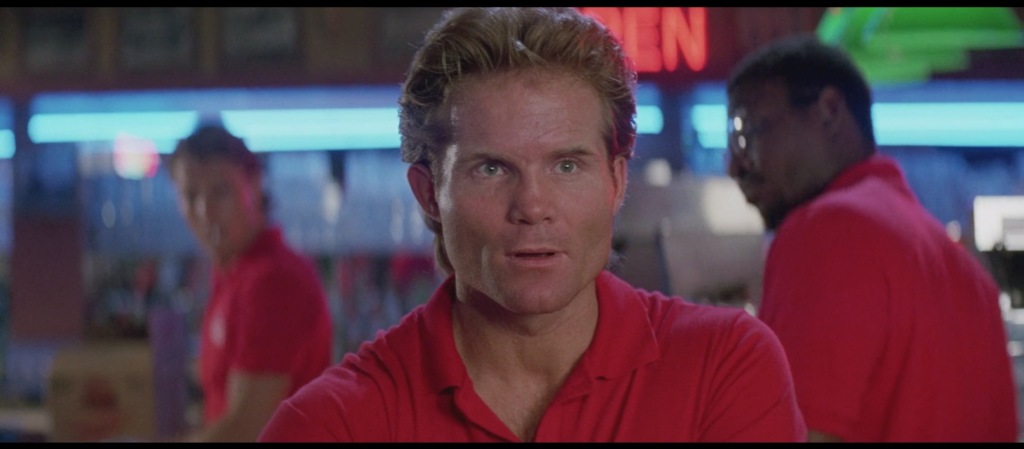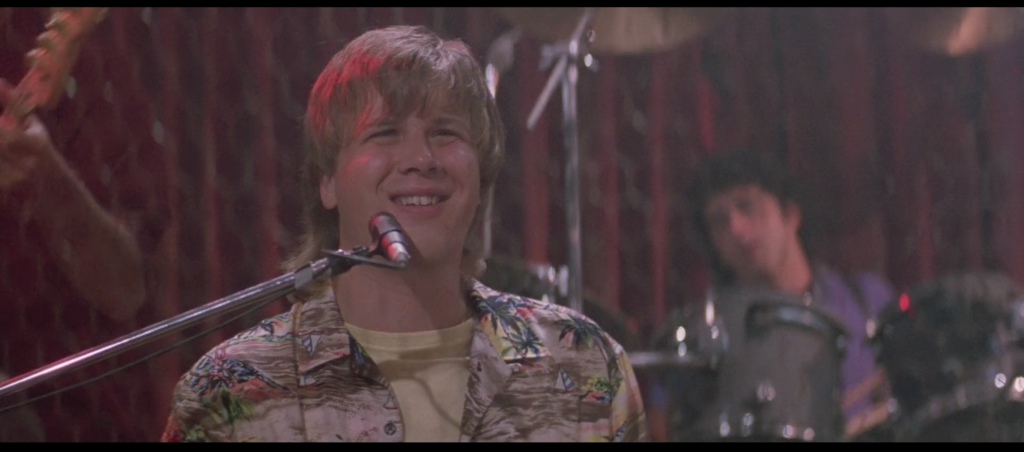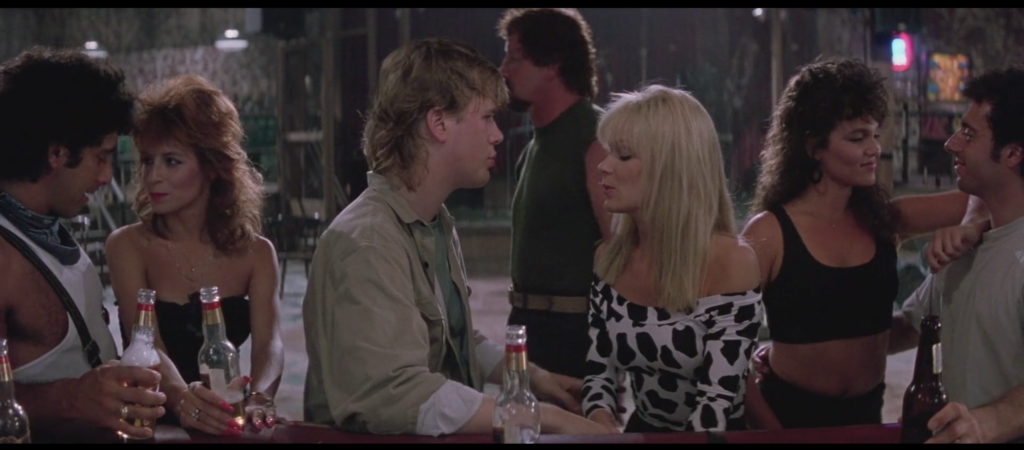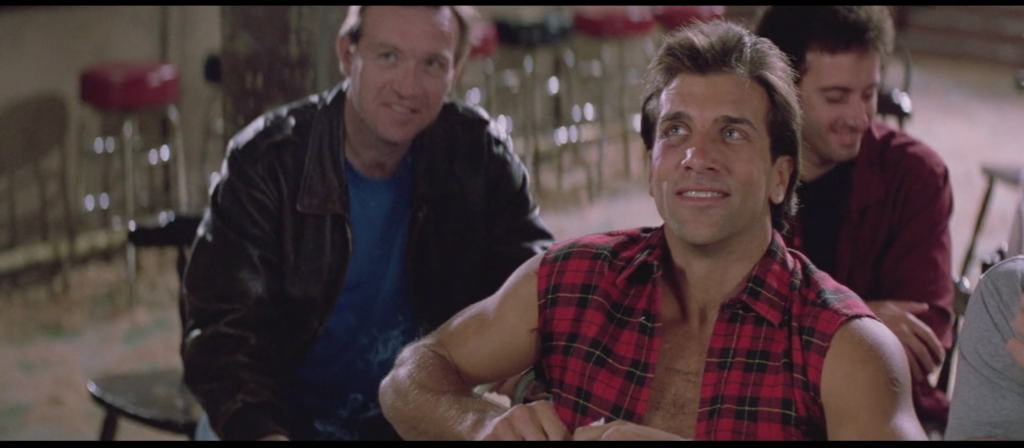Posts Tagged ‘cody’
357. Lap
December 23, 2019Road House closes up shop for good and all with the title superimposed over Jeff Healey’s crotch. Oh sure, you can say it’s a shot of his hands, or his guitar, or his hands on the guitar, but facts are facts. That’s the words ROAD HOUSE and that’s Jeff Healey’s crotch. It would be foolish to deny it.
And yet it’s nothing more than a return to form. The opening title of Road House is superimposed over a woman’s ass. That’s a communicative detail same as this is. They’re an indication that this movie is primal, instinctive, biologically raw. It’s about fighting, fucking, or fleeing, depending on the person and the needs of the moment. It’s a film about butts and balls. If Road House were a body part it would be someone’s bathing suit area. It makes sense to end this way. Leave us on a high note, Road House.
356. Dip
December 22, 2019I’m saying this in a voice that approximates that of Ash, the android—artificial person, excuse me—in Ridley Scott’s Alien when he says of the titular creature “I admire its purity”: I admire Road House‘s fecundity. Road House is a film deeply committed to giving and being more—more than you expect, more than it needs to be. It exists to run over the Ford dealerships of your mind with a monster truck, one in which it has balls big enough to come.
I can think of few clearer demonstrations of this than the way the film chooses to leave us with its protagonists, Dalton and Doc. How best to convey, as the film must, that they bridge their differences (perhaps with the corpse of Brad Wesley) and live happily ever after? Our friend Rowdy Herrington could have shown them dancing together at the Double Deuce, a choice that would have been all the easier to make given that the credits roll over, you guessed it, people dancing at the Double Deuce. That’s where Cody’s performing “When the Night Comes Falling from the Sky,” after all; couldn’t James and Elizabeth rock out into the sunset with him?
Ah, but they do! Our final image of our hero and his lover does indeed show them accompanied by Cody and his guitar. Only they’re not at the Double Deuce, they’re by the water outside of Emmet’s place. And Cody’s sitting on the grass, not on stage.
And they’re bare-ass naked.
Road House ends the story of Dalton by showing him skinny dipping with Dr. Elizabeth Clay. In fact it shows him running across the grass toward the water, cheeks to the wind, then doing a splendid high dive right into the water, at which point he and the good doctor make out, and make out enthusiastically. Like, you can imagine what’s going on beneath the surface of the water, that’s how enthusiastically. They’re young(ish) and in love and hanging out naked with their friend the blind white blues guitarist, and all is right with the world.
Always there is another trick up Road House‘s sleeve, always there is some new wonder to marvel at. This time it happens to be the main characters swimming around with their junk out with Jeff Healey in the background, and this time it happens to be the final chapter in the saga of Dalton, the best damn cooler in the business (as of that one morning when Brad Wesley flipped his coin and it came up tails). After all that death, after all those blows to the head, after determining whether a hobbyhorse has a wooden dick, after the three simple rules—love, wet and wriggling and real.
355. “When the Night Comes Falling from the Sky”
December 21, 2019Road House ends to the tune of “When the Night Comes Falling from the Sky,” the Jeff Healey Band’s cover of a song from Bob Dylan’s 1985 album Empire Burlesque. As you might expect, Healey peels the song away from the sound of the Big 80s Arthur Baker–produced original and moves it comfortably back into the bar rock sound Dylan favored when playing the song live with Tom Petty & the Heartbreakers as his backup band. Healey’s version is a bit less hard-charging though. It takes you more slowly and steadily through the song, which exists in Dylan’s “talking about romance with the voice of a prophet of doom” mode. In point of fact its structure and sound are close enough to “All Along the Watchtower,” especially in Healey’s version, that Dylan could have wound up with one of a hideous “self-plagiarism” lawsuit, John Fogerty–style, if things had worked out differently than they did.
Fortunately that never happened, and we can consider the song on the merits. It’s a minor-key track, kind of a down note to end the movie on, especially so soon after the whole “a polar bear fell on me” thing. But it’s a smokin’ performance by Healey—and, more importantly, a fitting sendoff for the romance of Dalton and Doc, two people who are going to have to learn to accept one another for who they are if their relationship is to survive.
Dylan/Healey sing of returning from a journey of hundreds of miles at the end of a chase. They hint at past traumas, narrowly escaped disasters. They say they’ve got no easy answers and shouldn’t be expected to lie to make up for that. They talk of protecting someone, and of not asking one another to do something they’re not ready to do. They sing of finding one another “in the wasteland of your mind.” As a reflection on the final days of the film, the period that stretches from the fire at Red’s to the shootout in the trophy room, I think it displays the emotional stakes for our two lovers quite well. Can true love emerge from the tumult? We’ll find out…
266. Head On Down to Wagon Days
September 23, 2019“Dalton, you gotta check this out,” Jack says. “Looks like Wesley wants to put a little something down on a new car.” This is his tipoff to his boss that Brad Wesley plans to take a monster truck and destroy a car dealership with it. Why he chose to deliver this information in a wisecrack is the viewer’s to decide. Spider-Man, I’m thinking—Jack reads Spider-Man comics, hence the resort to jokes during tense moments. Do I get a No-Prize?
But Jack and his banter and his weirdly small boots with his stonewashed denim tucked into them is beside the point. Mostly I want to call attention to the assemblage of humanity present for the impromptu monster truck rally. Jack is there, and so are his Double Deuce coworkers Carrie Ann and Frank Tilghman. Red Webster is there too—guess he didn’t skip town after all—along with Emmett, who has finally taken his place in the Council of Elders I suppose. Brad Wesley has brought along virtually his entire goon crew, though that’s to be expected when you’re planning to destroy a place of business in broad daylight.
And here in their car are Dr. Elizabeth Clay, Dalton, and Cody from the Jeff Healey Band. What was their plan for the afternoon? What did that conversation sound like? “Hey Cody, it’s Dalton. Look, me and the Doc were gonna swing by Wagon Days at Strodenmire Ford after lunch sometime. Wanna come with?” “Sure thing, man, just gotta drain the main vein first.” “Okay, well, as I said we won’t be heading over till like one or two, so you should have plenty of—hello? Hello?”
250. Whose side are you on?
September 7, 2019There’s something a bit unnerving about the alacrity with which Cody and the boys acquiesce to Brad Wesley’s command that they “play something with balls.” Surely one of Dalton’s oldest and dearest friends could be counted upon to reject the orders of the man’s nemesis, even if the end result of following orders is a beautiful woman taking her clothes off to the rhythm of “Hoochie Coochie Man,” right? But no, there they are, rocking out with their proverbial cocks out, smiling and seeming to enjoy every minute of their shared performance. True, Cody can’t see what Denise is doing, but from the hoots and hollers of the audience it doesn’t take Hercule Poirot to deduce what’s happening up there on the stage. Cody even gets a happy little caress out of the deal for himself, as you can see above. Is it as simple as “the show must go on”? Does Cody have an ulterior motive? Are he and his curly-haired compatriots simply being Horny On Main? I don’t have an answer to this one, I’m afraid. Perhaps that’s just one of the ways in which this scene signals the start of the Bad Times to come.
247. “Play something, Elvis!” or wheels within wheels
September 4, 2019“It’s like a morgue in here,” observes Brad Wesley of the mood in the Double Deuce. When you blow up a local business it’s hard to blame the locals for failing to be festive, but that’s Brad Wesley for you, a man who muscles car dealers for protection money by day and throws shit-happens-when-you-party-naked moonlight swims for his goons by night. Hell, he swerves all over the road by day too, so in a sense the party never stops.
Thus, his command to the band: “Play something, Elvis!” He’s looking right at all three members of the Jeff Healey Band when he says this. You’d be hard pressed to line up three white men who resemble Elvis less, but one gets the sense that Brad Wesley has, as so many older men do, calcified ideas of what constitutes a good time in every respect, music included. A rock and roll singer? Elvis. An actor? I’m guessing John Wayne. I wouldn’t be surprised if Wesley’s entire pop-culture cosmology consists solely of people Public Enemy warned us about in “Fight the Power,” “the Power” excluded of course.
Just after his command, which goes unheeded for a few moments, Wesley makes another proclamation: He tells no one in particular to “Get those firemen in here—I want to buy them a drink!” Seems like the least he can do to pay them back for the arson.
But for Wesley, the blame rests squarely on the shoulders of the arsonee, not the arsoner. “Risking their lives for that no-good faggot draft dodger Red Webster” is how he describes the firefighters’ duty that grim night, opening up alllllll kinds of yeeesh-inducing questions about Wesley’s politics, none of which have happy answers. Note that Wesley’s subsequently expressed complaint about Red is that he doesn’t chip in to improve the town like everyone else; knuckling under to Brad Wesley’s protection scheme is the traditionally heterosexual thing to do, apparently.
Red, you’ll recall, moved to Jasper twenty years ago, because he got married to an ugly woman from the area and fell in love with the place even as she fell out of love with him. Actor Red West (yep) was born in 1936, and assuming Red Webster is the same age that would make him 32 or 33 years old in 1969 when the marriage took place—well past the age of conscription, even given that the marriage exemption had been lifted by LBJ some years prior. At any rate, Jasper, Missouri is not exactly Canada, and it seems unlikely that Red had connections who could make a bone-spur deferment materialize for him even if his number came up.
What about Korea, then? We know from Brad Wesley’s big breakfast monologue that he served in that hot Cold War conflict, and from that we could assume he’d take especial umbrage at anyone who managed to weasel out of the service. But Red would only have been in his mid-teens during the Korean War, again placing him out of range of the draft.
All that remains to us, then, is peacetime conscription in the interwar years. And who was the most famous draftee during that time period? A man named Elvis Presley.
And who was in Elvis’s entourage, very much in real life? His old high-school chum Red West. Who was drafted too—and appeared in G.I. Blues, a movie in which he and Elvis were soldiers.
Play something, Elvis. “Reveille,” perhaps.
238. White Room
August 26, 2019With the Memphis Monologue on one side (following hot on the heels of Wade Garrett’s area hair) and the destruction as if by napalm of Red Webster’s auto parts store on the other (followed immediately by Denise showing us the girls), it falls to Jeff Healey to provide us with a bridge commensurate to that level of emotional intensity and body heat. Boy, does he deliver. The Jeff Healey Band’s rendition of that perennial nightclub floor-filler “White Room” by Cream (just go with it) is an absolute barn-burner (no pun intended), featuring a solo by Healey that could peel paint off the walls. It makes Wade Garrett consider attempting to get hisself double-teamed by two lovely young ladies standing next to him and Dalton, as he indicates to his protégé with a knowing nod and wink. (Dalton shakes his head in that “oh you lovable scamp” fashion; don’t think for a second he’s tempted himself, since his virtue will be put to the test shortly.) I think it’s possible it’s actually what sets Red Webster’s place on fire. It whips ass, is what I’m saying, and the movie is lucky to have music of such self-evident force and badassery in its arsenal when no one’s around to get punched in the head.
228. “Gentlemen, Wade Garrett”
August 16, 2019The staff of the Double Deuce react to the Coming of Wade in a variety of ways. Tilghman leers, of course. The Nameless Bartender’s eyes get a little wide, his mouth goes a little slack. Jack, baffled, asks “Who is this guy?” Hank mutters an awestruck “Holy shit.” “Exactly right,” Wade replies, as if his name were in fact Holy Shit.
In the middle of it all there’s Cody, who whether by the rasp of his voice or the scent of his musk recognizes who the mysterious stranger is and fills in Jack and the assembled gawkers accordingly. “Gentlemen,” he says, “Wade Garrett.” This is a callback to the moment he told the patrons of the Double Deuce that “The name…is Dalton,” obviously; It is Cody’s fate to be the standard bearer for the coolers of the world, the voice announcing their presence.
But does he have to be such a damn sexist about it? He was led out the back door to the scene of the fight by Carrie Ann. When he tells everyone it’s Wade, Stella literally has her hand on his shoulder. “Gentlemen” is what they get in response? “Ladies and gentlemen” and people of every gender identity deserve to know they are in the presence of Wade Garrett when this is in fact so. If Cody has the time to spill the tea on Doc and Brad Wesley, he can throw in a few extra syllables for the sake of inclusivity. They deserve it. Wade deserves it.
217. Cody spills the tea
August 5, 2019Gossip is a cruel mistress. Here’s Dalton, jauntily strutting into the Double Deuce for another night’s work at what has become the ideal bar. He knows his pal Wade Garrett is on the way (though of that day and hour knoweth no man). He’s just had a night of romance with Dr. Elizabeth Clay. Here he thinks he’s just sitting down for the usual chit-chat with Cody. But Cody keeps his ears to the ground in addition to those white-hot blues licks, and he feels obligated to inform his friend that Brad Wesley had a thing for the Doc once upon a time too.
Here’s how he puts it: “As I hear it, she left town and he went nuts. Heh. Small town, huh, Dalton? ‘Course, that’s just the word.” Hitchcock himself couldn’t have conceived of a crueler and more confounding open ending than that final sentence. Now instead of clearing things up for his pal, Cody has muddied them further. How can he discover for certain what the truth is?
Well, by asking Elizabeth directly, that’s how. Knowing Dalton, that’s something he’s unlikely to do. He keeps himself buttoned up, allowing others in when necessary and desirable, keeping other problems at arms’ length unless and until they make themselves impossible to ignore. A man like that would go right on ignoring his girlfriend’s failed marriage to his nemesis unless pushed—pushed, perhaps, by a friend who phrases his revelation of this information in a deliberately ambiguous way, so as to force his buddy’s hand and force him to address uncomfortable truths rather than letting them fester. A good friend, in other words.
Fortunately for Dalton, Wesley almost immediately starts attempting to kill all of his friends and associates, so the motion is tabled. There’ll be time enough for rehashing the past after a bunch of old men shoot Brad Wesley to death.
125. “I didn’t know she could sing!”
May 5, 2019If this configuration of Dalton and his padawan-learner Jack looks familiar, it’s because we’ve been here before. The exchange and fight scene that are about to occur are perhaps the purest distillation of the Dalton Path in the entire film, following the Three Simple Rules and their various chapters and verses to the letter. As a bonus they show the primacy and utility of Jack among the Double Deuce’s other bouncers. It is Jack, after all, to whom Dalton relays the Riddle of the Right Boot, counting on the younger man to solve it. When they move on the intruders who’ve come to the bar to murder a man by kicking him in the head with a boot-mounted knife on account of the fact that he fired a rich guy’s nephew, they move as one.
But how did they arrive at this point? By what strange magic were Dalton and Jack united at this moment? The magic…of rock.
Specifically Carrie Ann’s variant thereof. The big-grinned barmaid with the bangs has traditionally occupied a privileged position in Dalton’s orbit. It is she to whom he first entrusts the secret of his name. It is she who preaches his name to the other barfolk. It is she who is granted a glimpse of the ass.
Now that the Double Deuce has been cleaned up, it is she who takes the stage to demonstrate this fact to the viewer. Would any woman have been caught dead on the stage of the old Double Deuce, where the only thing separating you from the ravening hordes, whose attention is drawn to and focused on that stage in a way no other staffer or patron can claim, was a thin chickenwire line? To be honest, dead might be the only way a woman would get caught on that thing. Putting a blind guy up there strikes me as some kind of ADA violation as it is.
But now things are different. How different? Different enough that a server is up there singing her gorgeous, joyful heart out. (Kathleen Wilhoite is truly one of this movie’s MVPs; I have no doubt from the way she shakes and grooves and grins and at one point even puts her hand to her face like “holy shit I can’t believe this!” is a sign of completely sincere pleasure on the part of the actor herself.) A few weeks earlier she had to save all her vocal power for yelling “BASTARD!” at people she’d just brained with a beer bottle in a barfight. Now she’s singing Eddie Floyd with the Jeff Healey Band.
That’s why Jack drifts over to Dalton that night: Just to smile with delight and say “I didn’t know she could sing!” He’s so happy in that moment, so happy to see someone he thought he knew reveal a new and exciting side of herself, so happy to know that as a bouncer on the Dalton Path he helped make that happen. It’s his desire to share that happiness that puts him by Dalton’s side when Ketchum strides in, anonymous minions by his side, to try to kickstab Dalton in the skull. The right place at the right time, that time being “time to not be nice.”
Call it a coincidence if you want, or even synchronicity. I call it the ne plus ultra illustration of the Third Rule, and of how the obervance of that rule yields dividends none could predict. Be Nice, commands Dalton. So mote it be.
123. Chicken wireless
May 3, 2019Dalton purged the staff of the Double Deuce of its criminal element.
Dalton purged the crowd of the Double Deuce of its criminal element.
Dalton defeated the minions of Wesley in open combat.
Dalton liberated the small businessmen of Jasper, Missouri from the Jasper Improvement Society.
Dalton saved the life of yeoman rancher Emmett.
Dalton put the minions of Brad Wesley down like dogs, one by one.
Dalton lulled Brad Wesley into a false sense of victory that enabled the small businessmen of Jasper, Missouri to gun him down.
Dalton taught the bouncers of the Double Deuce to walk the Dalton Path.
Dalton taught Dr. Elizabeth Clay how to love again.
Dalton freed Jasper, Missouri from tyranny.
For these deeds we honor him.
For these deeds we celebrate him.
But through his efforts, Dalton also freed the Jeff Healey Band from the loose-hanging confines of their chicken-wire prison.
And it is for this deed that we dedicate our lives to his service.
So was it nice. So is it nice. So ever will be it nice.
In the name of the Dalton, the Jack, and the Holy Wade.
Amen. Amen. Amen.
—from the Most Meet and Worthy Charter of the Holy Jasper Empire, Forty-Fifth Post-Tilghman Schismatic Revision; So Decreed by the Ass-Mother of the Sisters of Carrie Ann and the Eternal High Priestess of the Elizabethan Order; So Ratified by the Intranuclear Auto Sales Consortium, the Swords of Tinker, the Swords of Denise, the Cody Navigators, and the Guild of the Valet Visible; Sworn by the Blood of the Bleeder, Jasper IX, AD 7201
105. Fate
April 15, 2019One hundred essays into a year-long Road House writing project, I feel about the film’s attempts to coin catchphrases and aphorisms exactly the way I felt when I’d written no essays at all: yikes. I mean, Does a hobbyhorse have a wooden dick, folks. Balls big enough to come in a dump truck. The writers have a relationship with the English language only slightly less estranged than their relationship to male sex organs.
But they can’t all be losers.
Just after the dump truck incident, a grumpy Morgan (there is no other kind of course) stomps over to Cody, whom he knows has a preexisting relationship with their mysterious new colleague. “This Dalton character,” he grumbles, “what’s his story?”
“His story is, you fuck with him and he’ll seal your fate,” Cody replies.
Now that’s how it’s done.
It’s a marvelous exchange insofar as it’s a rare moment when two characters have a conversation during which Dalton is neither a participant nor present. These are few and far between in this film, to the point where they stand out like sore thumbs each and every time. Off the top of my head, there’s this conversation, there’s Brad Wesley beating up the bleeder, Wesley and Jimmy talking to Red briefly after Dalton departs his store, and Jimmy and Ketchum spying on Dalton and Elizabeth from afar. Unless you count Wade Garrett breaking up shenanigans at a strip joint prior to receiving a call from Dalton, or Wade Garrett asking for Dalton’s whereabouts when he arrives at the Double Deuce, or Wesley’s goons making small talk prior to Dalton’s final assault on the Wesley compound, or Steve and Agnes doing their regular Saturday night thing before Dalton pops in and fires him—all of them scenes that exist so that Dalton can join them in progress—that is it. This is Dalton’s world, and what a treat to see other people live in it.
And who are the people in question this time around? Blind white blues musician Jeff Healey and hardcore wrestling legend Terry Funk. For Road House fanatics this is like the De Niro/Pacino diner scene in Heat.
But don’t think it’s just some goofy novelty act. (I didn’t say “Don’t think it’s some goofy novelty act,” mind you, I said “Don’t think it’s just some goofy novelty act.) Throughout this project I’ve been impressed by what the…let’s say non-traditional actors bring to the table. The naturalism Terry Funk brings to his role as an enormous man who gets paid to get angry and beat the shit out of people with tables is obvious. But spare a thought for Jeff Healey, too, who sounds like exactly what he is supposed to be: a guitar player chatting with dudes in bars. It works when he’s serving as a welcoming presence for Dalton, the one character he neither needs to intimidate nor impress, and it works when he drops the “hey man lemme put this here guitar down and buy you a beer” schtick and describes his friend like he’s the fucking Shogun Assassin.
Because that’s the message of “you fuck with him and he’ll seal your fate,” isn’t it. He won’t just kick your ass, or kill you, or make you wish you were never born or blah blah blah. Like a Norn with a mullet, he’s got the thread of your life in his hands, and if you step to him you’re going to find out exactly where that thread ends.
There’s another implication here that must be considered: Fate is predestined. Cody’s description of Dalton, then, is of one who will mete out the appropriate and appointed sanction to those who cross him, no more and no less. Perhaps it will be your fate to disappear from the movie a third of the way through and never return, like Karpis. Perhaps it will be your fate to pass out from terror when a stuffed polar bear is dropped on you and then emerge reborn, your sins forgiven, like Tinker. Perhaps it will be your fate to be murdered offscreen while wearing moonboots, like Morgan. Whatever the case, Dalton is not making the news, he’s simply delivering it to your doorstep.
It’s precisely the right description for the Dalton Path. Remember Rule Three, Verse Four: “It’s a job. It’s nothing personal.” What can be more impersonal than fate? And who better to do the job of sealing it?
104. I Thought You’d Be Bigger Vol. 2: Cody
April 14, 2019For a recurring joke, “I thought you’d be bigger” gets deployed with a pretty broad affect range. The first person we hear say this to Dalton is Frank Tilghman, whose delivery is difficult to characterize in any way but sexual. The second is Cody, lead singer of the Jeff Healey Band in the Road House Universe, and his delivery could not be further removed from his and Dalton’s mutual employer.
Dalton arrives at the Double Deuce, takes in the scenery, and discovers that the bar band are old friends. He sneaks up on the lead singer with the help of his identical and yet somehow not related bandmates, with a theatrical finger-to-the-lips Marian-Madam-Librarian “shhhh” gesture he shares with each. He hands Cody a towel to mop up the accumulated sweat and projectile beer on his face, for which Cody thanks him. “You play pretty good for a blind white boy,” Dalton says, beaming. Recognition dawns in Cody’s face. “Yeah, and I thought you’d be bigger,” he jokes, and the two embrace, laughing.
I’m gonna level with you: I love this moment. Why? Because it’s one of the only times in the film where Dalton is completely at ease. He’s been reunited with an old friend, a peer, not someone he has to impress, not someone he has to instruct, not someone who mentored him, not someone he needs to mentor. They know each other well, but as colleagues rather than sensei and student. They pass feverish gossip about old times and current times: “Man, this toilet is worse than the one we worked back in Dayton,” Cody says. He also mentions that he and “the boys” heard Dalton was headed to Jasper, presumably from Tilghman, although word among barfolk travels far and fast of course. Dalton therefore does not need to dazzle Cody, nor earn his respect. Cody’s been sitting on his barstool on stage, guitar in his lap, waiting to welcome Dalton with open arms. Anyone would be happy to step into that situation.
But most important of all is that this exchange is just that: an exchange. Dalton ribs Cody in a way he is, presumably, accustomed to being ribbed—that his chosen genre and evident skill are anomalous given his race and disability. Cody thinks this is funny to hear, which indicates he’s heard it a million times before. He uses “I thought you’d be bigger” as a riposte, indicating that these two have shared late-night “You know what people say to me all the time and totally drives me nuts?” conversations over Miller Genuine Draft when the patrons of that toilet in Dayton have long since retired for the evening.
The point I’m trying to make is this: While Tilghman’s “I thought you’d be bigger” is off-putting and invasive, Cody’s is familiar, friendly, and inviting. Eat your heart out, Snake Plissken and “I heard you were dead.” Patrick Swayze and Jeff Healey just took you to catchphrase school.
060. “Hey, you’re paid to play—play!”
March 1, 2019Here’s a singularly unpleasant chain of events. Wrapping up his latest white-blues scorcher, Cody, the lead singer of the Jeff Healey Band, announces he and the band will be taking a brief break because, quoting here, “gotta drain the main vein.” I go back and forth on this. Not on whether it’s an awful thing to say, because it is; even a film this aggressively stupid that line lands on first-timers like punch in the nose. But in a way I think it’s gutsy to introduce a character by having him use a grotesque euphemism for using his penis to urinate in his first spoken lines of dialogue. And at least it rhymes, unlike “I heard you got balls big enough to come in a dump truck” or “Does a hobbyhorse have a wooden dick” or “I sure ain’t gonna show you my dick” and probably a few other phallocentric howlers I’m forgetting. That’s no doubt one of his proficiencies as a bard.
Then this man—you remember this man, he’s Heckler, played by Charles Hawke, and he’s a non-voting observer nation in The Agreement—then this man says something less unpleasant to read but vastly worse to hear. “Hey, you’re paid to play—play!” he screech-slurs in a hideous Noo Yawk accent that’s practically Piscopovian in its cartoonishness. Rendered phonetically s it’s more like “HAY YA PAID TA PLAY PLAY!“, its dulcet outer-borough tones more than a bit anomalous in a film whose language is listed as “Yokel” on the cassette box.
With that he throws a bottle of beer, still half-full, at the chickenwire fencing surrounding the Double Deuce’s stage. The guy’s got a real cannon of a right hand apparently, because it shatters into a million pieces with a sound you might associate with dinner scenes in which a guest says something so shocking that the hostess drops her plate.
The reaction of Jeff Healey Band frontman Cody is inscrutable. Judging from the way he reaches his hand to his bottom lip and growls “Fuck!” I think we’re to take it that a piece of glass made it through the mesh and cut him on the face, but two data points would seem to dispute this. First, he’s not visibly injured in his ensuing conversation with Dalton, and Road House is pretty fastidious about making sure people bleed properly. Second and more puzzling is his reaction in the moment: He simultaneously snaps his head back and flops forward, as if completely poleaxed. Again, the bottle hit the chickenwire, not him.
The logical explanation is that Cody is a sort of “earth spirit” or personification of the Double Deuce, serving a function similar to that of Tom Bombadil vis a vis Middle-earth in J.R.R. Tolkien’s The Lord of the Rings, though with the additional characteristic of suffering when the place through which his existence is defined suffers. As an elemental of this sort he can be expected to react strongly to damage he senses through his metaneural network. However, at no other point does Cody display this type of symbiosis with the Double Deuce, not even in the cataclysmic brawl that takes place just a few minutes later, so this theory too needs reexamination.
So we turn back to the other participant in this pas de deux, Heckler. Heckler, who lurks on the margins of The Agreement, the dissolution of which nearly destroys the bar. Heckler, who throws a bottle with sufficient force to break it to pieces on a fence. Heckler, who can wound this troubadour with pure mental animus. It seems safe to conclude that he is a black magician, or even a demonic entity himself, warping the world around him with his corrosively evil presence. Witnessing the Coming of Dalton, he wisely chooses to depart rather than test his strength against a servant of the Secret Fire, leaving more ambitious or more foolhardy members of his infernal cohort to fight in his stead. Who knows how many such creatures Dalton has banished by his mere presence.
019. Staff
January 19, 2019Brad Wesley isn’t the only man in Jasper, Missouri with a goontourage. The employees of the Double Deuce whom Dalton does not fire when he assumes the role of cooler can generally be counted upon to have his back. I don’t think this is just the dubious whipped-dog loyalty of working stiffs to the middle manager who spares their jobs while shitcanning other people instead, either, though god knows we’ve all been there. Dalton brings out the best in good people and the worst in bad people. He’s a moral refinery. Here are the people who emerge purified from the kiln of his character. Most go unnamed, but let us not allow them to go unsung.
Jack
Bouncer. Expressive eyes. Quick on his feet, literally and figuratively. Played by Travis McKenna, whose body type sets him up as the opposite number to Brad Wesley goon standout Tinker, but never used as comic relief (except maybe once, when Brad Wesley goon standout Jimmy uses his prone body as a fulcrum to pole-vault onto the stage at the Double Deuce with a pool cue) and shows much higher levels of emotional intelligence. Fastest-moving character in the film save for Dalton himself. Visibly receptive to Dalton’s advice and instructions. Demonstratively appreciative of his fellow employees’ talents (he’s positively delighted to discover Carrie Ann’s singing voice). Frequently is the first to warn Dalton of Brad Wesley’s bad acts. Most likely to become the Dalton to Dalton’s Wade Garrett sometime down the line. Steve the Horny Bouncer whom Dalton fires due to his regular Saturday night thing calls him “Bear.” No one ever says this character’s name in the movie.
Younger
Bouncer. Just a big ol’ mumble-mouthed meathead, played by Roger Hewlett. Politely raises hand to ask a question during Dalton’s orientation session. Has the least screentime of the three bouncers, leaving the nature of his skill set largely to the imagination. The guy I would least like to tangle with personally, as he seems like he might not notice he’d beaten you to death until long after it was too late. No one ever says this character’s name in the movie.
Hank
Bouncer. The most visually dashing of Dalton’s crew, and the most openly fanboyish about his renowned exploits. Reenacts Dalton’s infamous throat-ripping maneuver, alerting us to this chapter in his checkered past. Frequently takes point in breaking up hostilities prior to Dalton stepping in. Smokes a lot. Played by future real-life murder-suicide perpetrator Kurt James Stefka, because every Lost Highway needs a fucking Robert Blake. No one ever says this character’s name in the movie.
Carrie Ann
Waitress. Singer. Breakfast delivery person. Engine of pure erotic power. Pal and confidante. Just a kickass character in every way. It helps that people do say her name in the movie, that’s for sure. Played by Kathleen Wilhoite and god bless her for it.
Stella
Waitress. Has that weird “German schoolgirl” vibe (description courtesy of MST3K/RiffTrax genius Mike Nelson) common to waitress types circa the filming of the original run of Twin Peaks, which you could probably convince anyone she was a character in as well. Tosses a bottle and hits a nitwit at one point. Played by Lauri Crossman. No one ever says this character’s name in the movie.
Ernie Bass
Bartender. Keith David. Unrealized potential. For some reason people say his name in the movie, though considering how badly he’s wasted who knows why.
The Nameless Bartender
Bartender. Prominent throughout the film. An original employee of the Double Deuce, unlike Ernie, who is brought in when things are flush. Multiple lines of dialogue. No one ever says this character’s name in the movie. No one ever bothered to name this character for the movie. Played by James McIntire, uncredited. There’s gotta be a story here, man.
Cody
Lead singer and guitarist of the Jeff Healey Band. Played by Jeff Healey. Not named Jeff Healey in the movie, though. Plays pretty good for a blind white boy, according to Dalton, with whom he has a long-standing working relationship. Possibly the person who recommended Dalton to Frank Tilghman, though this is never established and neither man seemed to realize the other would be working at the Double Deuce at the time of Dalton’s arrival. Adds much-needed verisimilitude and is a lot of fun to watch and listen to, even if acting is not Jeff Healey’s first calling. Recently I discovered that it’s Cody, not Dalton’s landlord Emmet, who sits on the shore as Dalton and the Doc skinny dip in that water at the end of the movie. They did seem pretty close, certainly.
Cody’s Drummer and Cody’s Bass Player
Drummer and bass player of the Jeff Healey Band. Played by Tom Stephen and Joe Rockman, who are amazingly not related despite both looking like they rolled off the dollar-store Eric Bogosian assembly line in the same batch. Silent observers of the events of the film, a mute Greek chorus. Great hair. No one ever says these characters’ names in the movie, not even “hey, Cody’s Drummer” or “Congrats on the chickenwire coming down, Cody’s Bass Player.”
???
??? That’s him on the left. I don’t know who this man is. This man is in a grand total of one scene, Dalton’s orientation session. This implies he’s an employee of the Double Deuce, but he is never seen before or since. No one ever says this character’s name in the movie. No one ever says his name outside of the movie. No record exists of the actor who played him. No evidence of his existence can be found anywhere beyond these few minutes of footage. Where he’s from the birds sing a pretty song, and there’s always music in the air. LET’S ROCK

